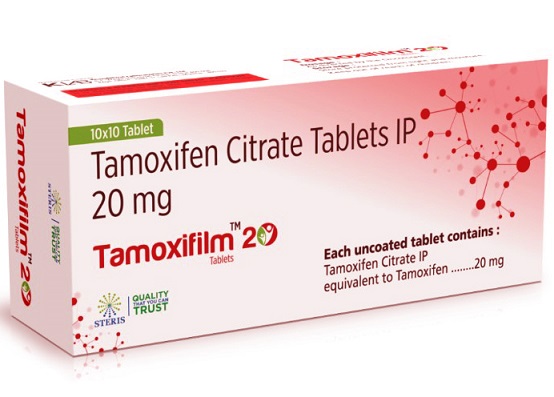Harvard Study Finds That Drug Commonly Used to Treat Breast Cancer Actually Causes Uterine Tumors!
Nikhil Prasad Fact checked by:Thailand Medical News Team Aug 24, 2025 5 months, 4 weeks, 1 day, 21 hours, 8 minutes ago
Medical News: A Life Saving Drug with Hidden Risks
Tamoxifen has been one of the most widely used drugs in the fight against breast cancer since the 1970s. There are the usual pharma claims that it helped millions of women with estrogen receptor–positive breast cancer by lowering the chances of recurrence and improving survival rates. However, researchers have long known that while tamoxifen is a lifesaver, it also carries a rare but serious side effect—an increased risk of developing uterine cancer. Until recently, the reasons behind this link remained unclear. Now, this
Medical News report uncovers the findings of an international team of scientists who discovered how tamoxifen activates a cancer-driving pathway in the uterus, leading to secondary tumors.
 Harvard Study Finds That Drug Commonly Used to Treat Breast Cancer Actually Causes Uterine Tumors
What The New Study Reveals
Harvard Study Finds That Drug Commonly Used to Treat Breast Cancer Actually Causes Uterine Tumors
What The New Study Reveals
Researchers from the Berlin Institute of Health at Charité–Universitätsmedizin Berlin, the Broad Institute of MIT and Harvard, Massachusetts General Hospital, and Dana-Farber Cancer Institute worked together to solve this medical puzzle. They found that tamoxifen does not simply act via a hormonal effect in the uterus. Instead, it directly triggers a powerful cellular pathway called PI3K, which is known to drive the growth of uterine cancers. Normally, spontaneous uterine cancers are linked to mutations in the PIK3CA gene, which activates this pathway. But in women taking tamoxifen, these mutations are often missing because the drug itself activates PI3K, eliminating the need for mutations.
Why This Discovery Matters
The findings are significant because they represent the first clear evidence that a cancer drug can paradoxically act as a tumor promoter in another organ. By bypassing the need for genetic mutations, tamoxifen provides a direct push toward cancer formation in uterine tissue. While the overall risk is still being evaluated versus the life-saving benefits of tamoxifen in breast cancer patients, the research highlights an urgent need to better understand therapy-related cancers.
How The Research Was Conducted
To uncover the molecular details, the scientists studied tumor samples from women with tamoxifen-associated uterine cancers and compared them to naturally occurring uterine cancers. They also carried out genetic sequencing and laboratory experiments in mice. The results showed that tamoxifen uniquely activates PI3K signaling, which in turn leads to cell overgrowth and cancer risk. Importantly, this activation was not caused by DNA damage or mutations, but rather by the drug’s direct interaction with estrogen receptors and related cell signaling processes.
Implications For Patients and Future Research
While the study tries to reassures patients that tamoxifen’s benefits still outweigh its risks, it also opens new opportunities for prevention and treatment. For example, drugs that block PI3K signaling could potent
ially be combined with tamoxifen to protect the uterus while preserving the breast cancer–fighting benefits. Researchers also believe that this discovery may apply to other cancer therapies, where side effects might arise from similar hidden pathways.
Moving Forward
The next steps will involve testing whether other widely used cancer drugs may unintentionally trigger dangerous cellular pathways in different organs. By doing so, doctors can design safer treatments and develop targeted prevention strategies for women at higher risk of uterine cancer while on tamoxifen therapy.
The study findings were published in the peer reviewed journal: Nature Genetics
https://www.nature.com/articles/s41588-025-02308-w
For the latest cancer news, keep on logging to Thailand
Medical News.
Read Also:
https://www.thailandmedical.news/news/new-york-study-finds-that-chemotherapy-can-backfire-by-making-cancer-more-aggressive
https://www.thailandmedical.news/news/scientists-warn-that-vitamins-and-diet-trends-may-secretly-fuel-cancer-instead-of-fighting-it
https://www.thailandmedical.news/news/study-alarmingly-finds-that-ct-scans-are-possibly-triggering-the-onset-of-cancers
https://www.thailandmedical.news/news/breaking-past-cancer-studies-using-rodents-are-flawed-because-it-has-now-been-found-that-human-pd-1-functions-differently
https://www.thailandmedical.news/news/drug-news-fda-warns-that-car-t-therapies-involving-abecma-breyanzi-yescarta-carvykti-or-kymriah-can-increase-risk-of-secondary-cancers
